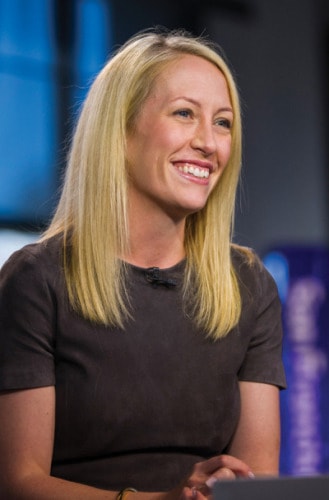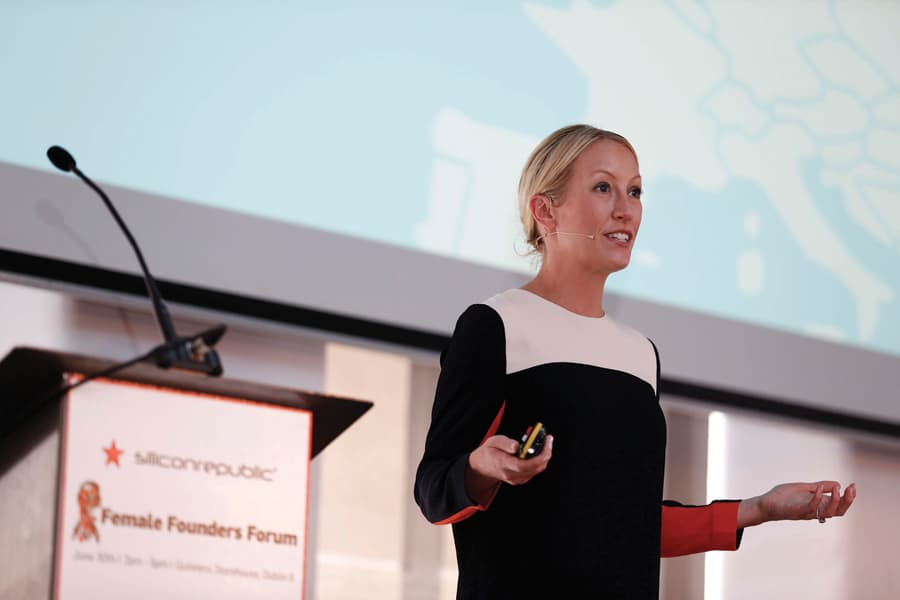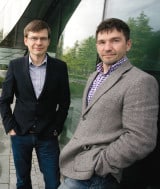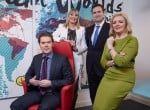Julia Hartz, pictured here at the Silicon Republic Female Founders Forum, which was held in Dublin in June.
Anne Whelton speaks to Julia Hartz, co-founder and president of Eventbrite about leadership and creating a global marketplace for live experiences.
What makes a good leader? Is it brains or brawn, talent or luck? For former Apple boss Steve Jobs, it was a passion for innovation: “Innovation distinguishes between a leader and a follower”. For many other successful leaders, important characteristics have included confidence and commitment.
But what about the next generation of leader − in the ever-changing business world will the same characteristics that are important today, still be essential tomorrow?
For Julia Hartz, co-founder and president of global ticketing company Eventbrite, the future of leadership is all about autonomy and empowerment – creating an environment where everyone’s opinions matters.
Brite idea
Established in San Francisco in 2006, Eventbrite is a ticketing platform that provides a way for anyone − both organisations and individuals − to create an event, promote that event online and sell tickets.
Founded by entrepreneurial couple Kevin and Julia Hartz and their co-founder, Renaud Visage, the trio saw a significant gap in the market for a solution that served the needs of both event organisers and attendees.
“Before we started Eventbrite we found there was a gap in the industry for event organisers who may not be hosting large-scale events or conferences, so things like fundraising events, marketing courses and so on,” says Julia Hartz.
Eight years on and Eventbrite has certainly filled that gap. To date, the company has processed over 200 million tickets − 60 million of which were processed in 2013 alone − and raised €150m in capital from investors.
For Eventbrite’s phenomenal success, Hartz pays particular tribute to the 375+ strong team of ‘Britelings’ that have assisted in the organic growth of the company. She says: “Our success has truly been a team effort. For me, leadership is all about painting a compelling vision for your company and really understanding what motivates your team − not just from a group perspective but also from an individual perspective. This allows you as a leader to hand the reins over to your team and say ‘go ahead and achieve our goal’.”
This spirit of autonomy is something that has permeated the team at Eventbrite from day one, and according to Hartz has been the true success story of the company. “When I look at what we’ve accomplished so far at Eventbrite, it’s safe to say that the team we’ve assembled is my proudest achievement.
“As with any large organisation, it takes smaller teams within the organisation to achieve goals, and, in turn, feed into the overall grand vision. At Eventbrite, as the company has grown, we’ve seen start-ups within the start-up emerge, and the challenge for us as leaders has been ‘how do we create the autonomy for these smaller groups to get together, brainstorm and really feel like their ideas and suggestions are making an impact to the overall organisation?’ − it’s something we strive to achieve every single day.”
Benefiting the bottom line
The company currently generates revenue by charging event organisers a fee of 2.5% of the ticket price plus 75 cents per ticket sold. However, it does not charge a fee for free events, which make up a large share of the transactions on the site.
“Free events are a very important part of our business,” says Hartz. “We’ve found that people that attend these events have become the number one driver of new paid events, so it’s a virtuous cycle – the more attendees we can get on the site registering to attend free events, the better for the paid side of the business and ultimately our bottom line.
Divide and conquer
 First-time entrepreneur Hartz came at the industry and her role as president from left field. “I certainly came from a non-traditional background in terms of tech entrepreneurship,” she says. Prior to starting Eventbrite, Hartz worked as a television development executive at MTV and FX Networks, where she oversaw the development of popular shows such as The Shield, Nip/Tuck and Rescue Me and as she says “had little or no experience of starting a company”.
First-time entrepreneur Hartz came at the industry and her role as president from left field. “I certainly came from a non-traditional background in terms of tech entrepreneurship,” she says. Prior to starting Eventbrite, Hartz worked as a television development executive at MTV and FX Networks, where she oversaw the development of popular shows such as The Shield, Nip/Tuck and Rescue Me and as she says “had little or no experience of starting a company”.
Luckily, her co-founders were not as wet behind the ears when it came to entrepreneurship. Before founding Eventbrite, Kevin Hartz, Julia Hartz’s co-founder and husband was previously co-founder and CEO of Xoom Corporation, an international money transfer company, and had served as an early-stage investor and advisor to successful start-ups including PayPal, Pinterest and Airbnb. While Eventbrite’s third co-founder, Renaud Visage, brought the necessary technical knowledge to the table, serving as the company’s founding technical architect. It is this mix of backgrounds that, according to Hartz, has allowed Eventbrite, and specifically husband and wife team, Julia and Kevin to “divide and conquer”.
… Leadership is all about painting a compelling vision for your company and really understanding what motivates your team.”
“When we started Eventbrite, Kevin and I were actually engaged and we got married about six months later so it was certainly an intense time, but we made a conscious decision very early on that we would never let the company get in the way of our relationship. Now as parents, we’re also conscious of having a healthy work/life balance for our children’s sake. While there is no cookie-cutter day, we always take our daughters to school together in the morning before work and ensure that we are home by 6pm to have dinner with our girls and put them to bed. ”
She adds: “It’s our golden rule to ‘divide and conquer’; it was advice we got from our friends Michael and Xochi Birch, who are also a co-foundering entrepreneurial couple. What it’s allowed us to do − apart from prevent overlapping − is really focus our attention on two separate parts of the business, which helps when it comes to problem solving and a lot of the smaller day-to-day issues.”
Ireland’s call
And conquer this entrepreneurial couple certainly have. Less than 10 years in and Eventbrite is dominating the online ticketing landscape; nowhere more so than in Ireland, where the company recently opened an office.
“Ireland has always been an interesting market for us,” says Hartz. “We’ve seen significant organic growth over time that shows us that the Irish really like to ‘gather’. While that may seem clichéd to say, for the size of the population in Ireland, our ticket sales have been quite significant.”
Earlier this year, the company opened its first office in Dublin’s Digital Hub, where it currently employs a “typical launch team” of three people. However, Hartz is quick to add that the company is considering a significant recruitment drive for more Britelings in Ireland in the near future.
“Our initial decision to open an office in Dublin was really all about timing and resources − finding the right people to help us enter the local market. We strongly believe that to build a true online marketplace in a country, you need to have a presence there and be able to connect with people on the ground.
“The interesting and exciting thing about our Irish operations is that since we’ve opened our Dublin office, we’ve surpassed our Irish ticket sales from the last three years combined. So we can really see the momentum in the Irish marketplace, and we believe this is only the beginning for our Irish operations.”
Get connected
With expansion in Ireland in its sights, how do the next five years look for Eventbrite as a whole? In a word: connections.
“We’re focused on growing a global marketplace for live experiences and that’s a big mission, so everything that we do, is centred and aligned around that,” says Hartz.
“Business is about evolution, and at Eventbrite, we want to be the place where anyone in the world can find great live experiences. Now more than ever, gathering offline is one of the most important parts of human connectedness and we want to be the engine to get people out there and get them connecting.”
Mobile growth is also playing a part on how Eventbrite is evolving and with global mobile traffic currently accounting for nearly 20% of all internet traffic, it’s hard to ignore. “We’re always looking at mobile growth and thinking about how we can further engage consumers and create a technology that’s possible to use and accessible on any platform/device,” she adds.
Global domination aside, entrepreneurship certainly agrees with Hartz; when asked to describe success, she simple says: “Total, utter, happiness.”
Eventbrite in numbers
• 375+: Number of employees
• €150m: Raised in investment
• 1 million: Number of events held in 2013
• $1bn: Total volume processed in 2013
• 187: Countries where events were held in 2013
• $177m: Raised at fundraising events throughout 2013





